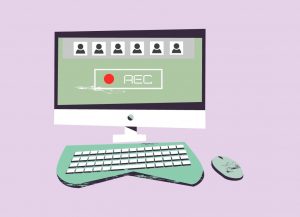
COMMENTARY: Should professors ask for students’ permission to record class?
For the Fall 2021 semester, UHCL offers three different course modes: in-person, online and hybrid. The online and hybrid modes offer students and faculty the ability to meet and work on assignments from home. Similarly, some classrooms on campus offer the ability to simulcast lectures from the classroom for students unable to attend in-person classes.
Many faculty record class lectures and discussions to upload them onto the platforms where their classrooms are hosted, such as Blackboard or Canvas. UHCL uses Blackboard. These recordings can sometimes include students’ names, faces and discussions.
Academic Affairs offers faculty a statement to add in their syllabi about recording in class, which they can decide to include or not. The message being that students cannot record lectures without the faculty’s permission.
This statement, however, does not mention anything about needing other students permission to record, whether it is by the faculty or other classmates. But in this day and age where a lot of the classes are online, students should also receive that same level of respect and be asked whether they want to be recorded or not.

Because online classes come with more potential distractions than in-person classes, some faculty may require students to turn their cameras on for the entirety of the class. As a result, when professors are recording class to upload online, they should extend to students the courtesy of asking if they want to be recorded.
Texas is a one-party state, meaning people who are party to a conversation have the right to record as long as one person in the conversation consents. Thus, students and faculty are able to record as long as they are a part of the conversation.
However, when it comes to reasonable expectation of privacy, classroom settings can be considered a safe space where students and faculty feel as if there is a level of privacy and therefore should not be recorded.
The Family Educational Rights and Privacy Act (FERPA) ensures the privacy of students’ educational records. For recordings, the act applies when the recording is directly related to the student and kept by an institution or someone acting for them. Furthermore, recorded lectures do fall under FERPA.
If students are caught recording class without permission from their instructor, they could receive disciplinary action from the Dean of Students office. Additionally, they can run into legal trouble if they are disseminating someone’s intellectual property.
Intellectual property refers to the ownership of someone’s work that stemmed from their human intellect. Class lectures can be protected under intellectual property because they include the professor’s own work and research.
This argument could also apply to students because when class discussions occur students have the intellectual property rights to their thoughts as well. Additionally, students in art and design classes engage in class critiques for projects that they created. These discussions and critiques are students’ intellectual property.
Faculty, however, may disagree and think that a student’s work is not or should not be considered intellectual property given that they are in a classroom setting talking or presenting something that was assigned to them by the instructor as part of their curriculum.
Some reasons faculty are against their lectures being recorded include being misquoted or misrepresented, they have a reasonable expectation of privacy, the lecture is their intellectual property, and they might not think students who miss class without an excuse deserve to have a recording.
Some concerns from faculty include that they are taken out of context and misrepresented online or in front of others. Also, because some faculty or students may expect privacy in certain settings, they could be hesitant to speak up if they know they are being recorded.
Lectures are the faculty’s intellectual property and with recordings, they run the possibility of recordings being stolen. This is another reason they would not be keen about someone recording their class.
Furthermore, faculty might believe it is unfair that other students show up for class and a student who is absent without an excuse can also have access to the lectures. However, during the age of COVID-19, leniency and understanding is important. Because things happen, being adamant about not recording lectures can affect students, especially when faculty fail to record their lectures, regardless of whether a student has an excused absence or not.
Ultimately, when it comes to recording lectures, faculty should ask students for their permission too. If some students do not want to be recorded, but someone needs a recording because they missed then the faculty should make sure that they record their lecture slides or pin their video in a Zoom call so it is the only one that appears in the recording. In terms of sound, the faculty can ask the students who do not want to be recorded to ask questions in the chat, rather than by voice.
Although this practice may not be popular or seen as a necessity now, as the rest of the classrooms get simulcast equipment, faculty and staff need to make note on the issues, decide on best practices and implement them as the future of many college courses seems to be in the hybrid course format.
